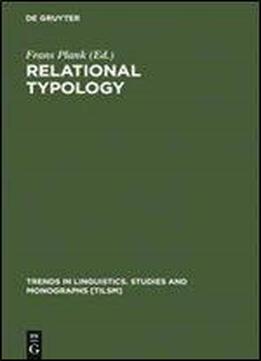
Relational Typology
by Frans Plank /
2013 / English / PDF
14 MB Download
That language typologists are focusing attention on the relational structure of clauses is certainly no new trend in linguistics, even if some insights afforded by the typological perspective appear to be relatively new. Numerous individual and concerted attempts are on record of typologies based on supposedly significant cross-linguistic differences in relational structures involving the main constituent parts of clauses. Also on record, however, are certain fundamental obstacles hindering relational typologists and typological research in general, of which the following three deserve to be singled out. Firstly and most obviously, there has been, and continues to be, the handicap that not enough thorough and reliable empirical descriptions are available even of the most basic aspects of relational clause structures of a sufficiently wide variety of languages. Secondly, owing to a tendency to employ preconceived descriptive notions familiar from one or another tradition of describing one or another kind of languages, without much concern for spelling out the precise descriptive content of these notions and for justifying their cross-linguistic applicability, there has always been the danger of terminological looseness, often nourishing the illusion that relational clause structures had been adequately described if all that had really been achieved was to 'accommodate' them in one or another terminological framework of unquestioned empirical import. And thirdly, the notion of 'types' itself still needs further clarification and, of course, empirical justification, if typology is to be more than mere classification of languages according to more or less arbitrarily selected grammatical features. It is an awareness of the urgency with which such obstacles demand attention that motivated the collective efforts forming the present volume.
s











